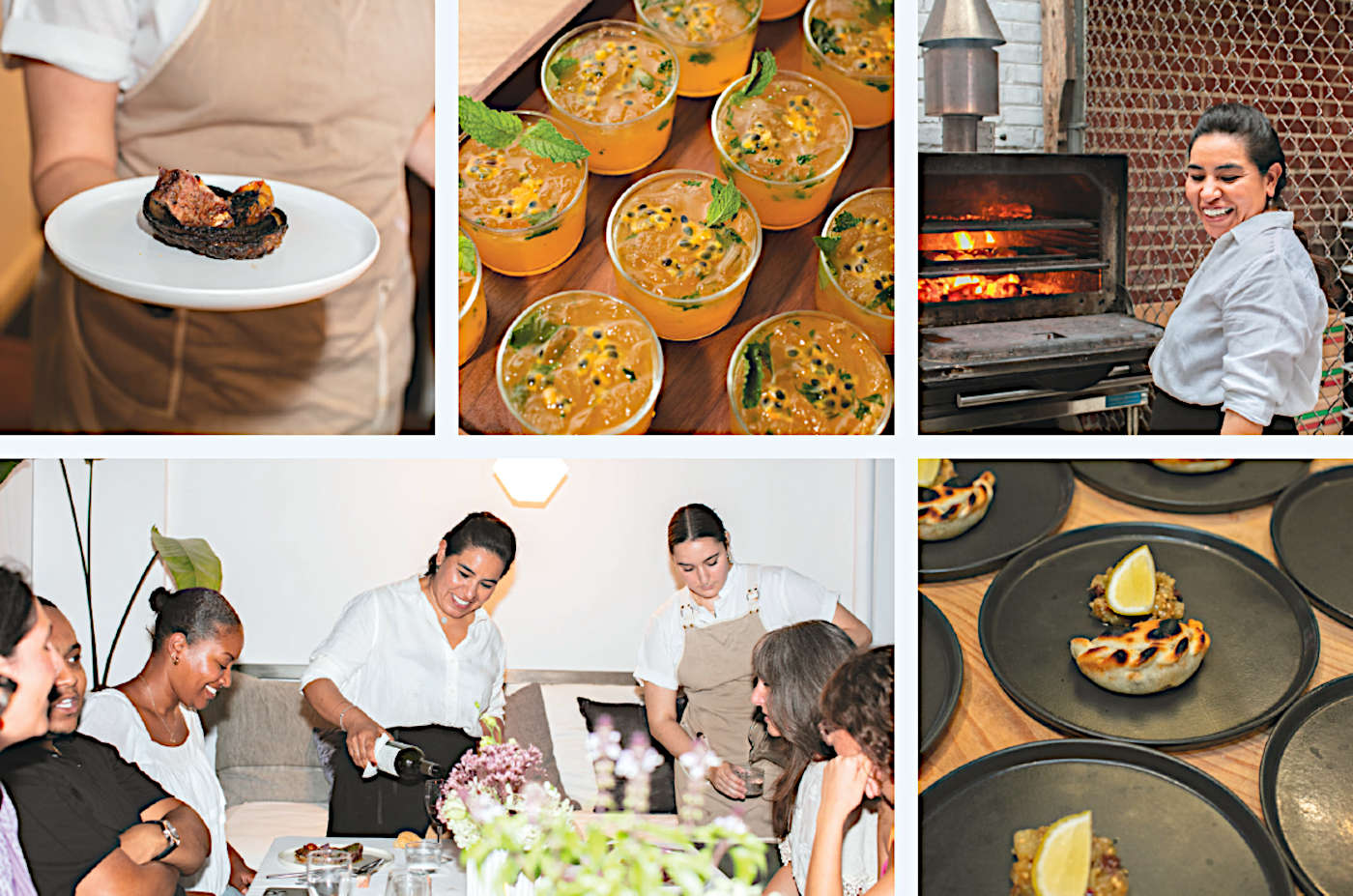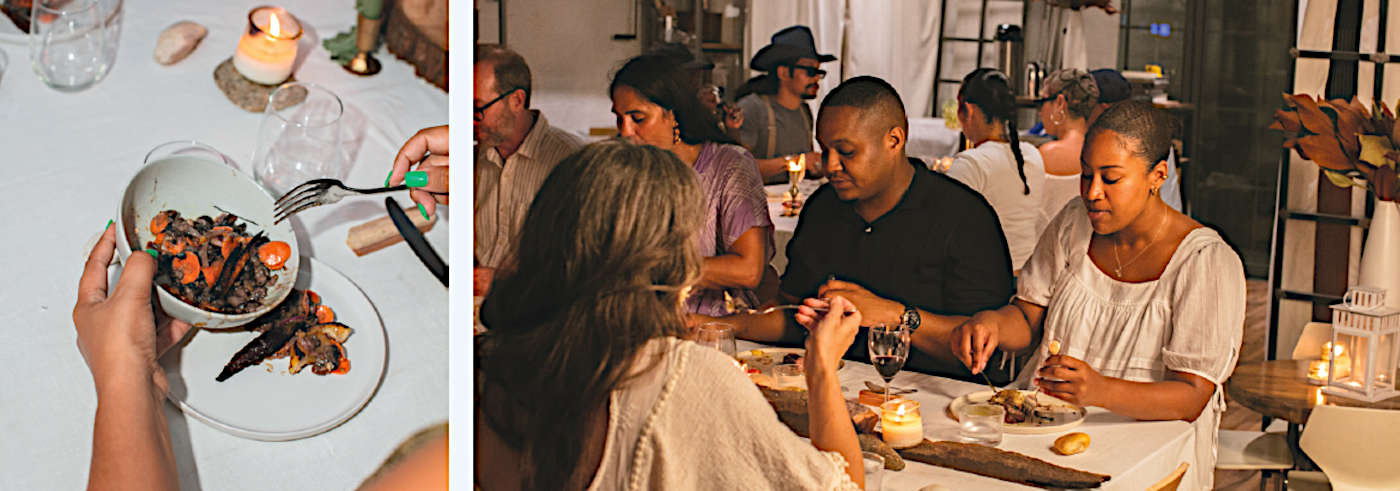Jezabel's Argentina
Some people collect spoons when they travel. Not Jezabel Careaga, chef and owner of West Philly’s Jezabel’s café. “I pick up bay leaves wherever I go,” she says. “Right now, I have bay leaves from three countries in my kitchen.” Her current favorite may be the ones she plucked in Paris, she says.
This quirky habit is totally consistent with Careaga’s worldview. Her business is built on the idea that you can create a sense of place through flavor. Jezabel’s trademark dishes are the ones she made with her grandmother growing up in Northwest Argentina. Her mission is to transport guests to her home village in Jujuy Province, to the hand-crafted solid wood table her grandfather built for family meals.
“It’s the taste of home I wanted for myself,” she says.
HER FOOD ROOTS
It’s easy to imagine how homesick Careaga must have been when she came to the United States. Back in Argentina, she had spent countless idyllic days with her grandmother, an accomplished cook, while her parents worked. “I went with her to do her morning route every day—butcher, grocery, bodega.”
Growing up, she was always around food. Typical meals centered on fresh, local vegetables, plus rice or pasta, and meat. “Where I’m from, we eat incredible produce from the Andes within two hours of us. You can’t get better produce than what I grew up eating.”
Though her mother was often busy with work, she also cooked. She’s the inspiration behind some of Jezabel’s most beloved baked goods, like her alfajores cookies. “My family made everything from scratch. I never had a hot dog or frozen hamburger,” says Careaga.
It’s the type of culinary upbringing many Americans of Careaga’s generation missed out on amid the proliferation of packaged and convenience foods of the 1980s and ’90s. She compares the popularity of alfajores in Argentina to chocolate chip cookies in America, but there was no equivalent to Chips Ahoy.
AN APPETITE FOR TRAVEL
Careaga can’t remember a time when she didn’t want to explore the world beyond Northwest Argentina. A fateful doctor’s appointment she had as a teenager put her on track to start seeing and tasting places and cultures far and wide.
“The doctor was telling me his son studied hotel management and hospitality. He was working at restaurants in Europe,” she recalls. “I thought, ‘That’s what I want!’” A short time later, Caregaga started college, studying those very subjects.
Even then she knew she wanted to cook, but culinary school was too expensive. “I knew with a degree in hotel management I could eventually make my way to the kitchen,” she says. That’s precisely what unfolded over the following years—it was during a stint working in a Miami hotel that she first decided she wanted to open a café of her own.
“There’s a big Argentinian community in Miami, so there were restaurants. I went to them when I was feeling the most homesick. I would order alfajores, and they were … very processed-tasting,” she says. It’s obvious she doesn’t want to trash-talk her fellow restaurateurs.
“It’s just that I was used to homemade things made with quality ingredients,” she says. “I wanted it to taste more like home.”
That’s when she decided to make the thing she wanted for herself. Her then-boyfriend owned a property in Philly, his hometown, and they decided to open Jezabel’s here in 2010.
WHERE ARGENTINA & PHILLY CONVERGE
Back then, the Philadelphia local food landscape wasn’t quite what it is today. People weren’t all that familiar with the regional cooking of Northwest Argentina. Careaga was making her signature style of empanadas, of course, “But I also was serving bagels.” That first location was on the corner of 26th and Pine streets in Fitler Square. It was a neighborhood spot, and the neighborhood wanted to grab a bagel and coffee before work.
Over the past 14 years, Careaga has seen the Philadelphia area become more like her hometown in Argentina, at least when it comes to food. “I’m happy to see the evolution toward local and seasonal here. I love being creative with what we have in season,” she says. “There is a beauty about being in Philadelphia and having so many local things.”
She often visits local farms, picking up the best produce the region has. Taproot Farm is a special favorite. “Sometimes you get a fresh onion so sweet you can eat it raw like an apple,” she says. Careaga thinks it would have been hard for her to put down roots in a place without this connection to local food and ingredients.
“SOMETIMES YOU GET A FRESH ONION SO SWEET YOU CAN EAT IT RAW,” SHE SAYS. JEZABEL CAREAGA THINKS IT WOULD HAVE BEEN HARD FOR HER TO PUT DOWN ROOTS IN A PLACE WITHOUT THIS CONNECTION TO LOCAL FOOD AND INGREDIENTS.
Even more than the farms and foods, it’s the community here that’s made Careaga feel like this city is her home. She finds inspiration wherever she goes, and then filters it through the lens of her Argentinian culture. On a recent visit to Mighty Bread, she had a memorable panzanella, the Italian tomato-bread salad.
She went back to her kitchen and created a salad based not on bread but on the idea of fideos, a noodle dish popular across Latin America. “I toasted pasta and added tomatoes, onions, and spices,” she says. The resulting dish hits similar flavor notes to a panzanella but with a completely original twist.
The dressing is spiced with ají molido, a coarsely ground red chile that’s a staple in Northwest Argentina. “I think this dressing with the toasted pasta will become a staple, and I’ll rotate the produce,” she says. “It’s the spices that really take me home.”
TRUE TASTES OF NORTHWEST ARGENTINA
The fideos are just one of the food icons that transport Jezabel’s. Careaga is probably best known for her baked empanadas. These savory pockets are baked, not fried. The crisp exterior is utterly grease-less, which helps the potent flavors of the filling shine. At any given time, she makes six or more types of empanadas, but the beef is the most iconic.
“I use local beef from Happy Valley Meat Company,” she says. The State College–based supplier specializes in connecting chefs with ethically produced meat. But it’s not all about the beef, according to Careaga. “Again, it’s the spices of Northwest Argentina that make this so special—ají molido, cumin, chili powder, paprika.”
The beef empanada filling also includes sweet pops of raisins. Raisins aren’t always found in Argentinian-style beef empanadas, but that’s how Careaga’s aunt made them, so she makes them that way, too.
Another important menu item for Careaga is the aforementioned alfajores de maizena. Alfajores are butter-cookie sandwiches filled with dulce de leche. The edges are crusted in shredded coconut. If you’ve ever had one, you know why this treat is as adored by Argentinians as the chocolate chip cookie is by Americans.
These are the cookies the Argentinian restaurants in Miami couldn’t get right, at least not by Careaga’s standards. “My mother made them from scratch with the freshest, best ingredients.” Careaga takes the same approach at Jezabel’s. That’s why she gets frequent messages from other Argentinians thanking her for relieving their homesickness with the perfect bite.
“Getting these messages, that’s why I do what I do,” she says.
LOOKING AHEAD
Careaga moved Jezabel’s to a larger space in 2018. There’s more room now to bring her vision to life. She no longer serves bagels. “I just want to become more and more true to my inspiration. I want to be as Northwest Argentinian as possible,” she says.
To do that, she wants to import spices, both for use in her kitchen and for retail. The spices of Northwest Argentina are an important part of what gives Careaga’s food its distinctive sense of place: spices grown at high altitudes in the Andes, where the climate and soil conditions come together to produce distinctive flavors, she says. “They taste and smell like nothing else on earth.”
For now, when she doesn’t have those specific ingredients on hand, Careaga shops at a neighboring small business, International Foods & Spices. “The spices there are really good,” she says. That’s high praise from a woman who can taste the difference between French- and American-grown bay leaves.
MORE THAN THE FOOD
There’s something beyond food and ingredients that brings Careaga back to Argentina. “We have a word for the time you spend with people after you eat. It’s sobremesa. You have a beautiful meal, and then you sit. You don’t clear the table,” she says.
It’s this connection over food that’s as important to Careaga as the food itself. Maybe even more important. This is friendship and community that can make you feel at home no matter what you’re eating, even if your family is 5,000 miles away, according to Careaga.
“Sobremesa happens here a lot when I’m with my Italian friends,” she says.
She notes that Italian food is also extremely close to her heart. “Argentinian food has a lot of Italian influences,” she says. Pasta was also a staple of her family table growing up. Just like in the United States, Argentina saw mass immigration of Italian people in the early 20th century because of the economic hardships in Italy at that time.
One of her favorite parts of food culture is how highly specific it is, how a particular spice or the combination of beef and raisin can take you to another place with one bite. But she also loves finding the common threads that connect one culture to another. They’re everywhere you look, she says.
Chefs all over the planet cooked with their grandmothers, after all. “It reminds us that we’re more alike than we are different,” she says.

JEZABEL L’ATELIER
As she built the second location of her restaurant, there was something she couldn’t get out of her mind: the family table she ate at as a child. It was a solid-wood table handmade by her grandfather. She wanted that kind of high-quality furniture, both for her home and for the restaurant. So she learned how to make it. In fact, she made all the furniture in her café. Today she has a second business making bespoke furniture.
Learn more on Instagram at @atelier.phl.






